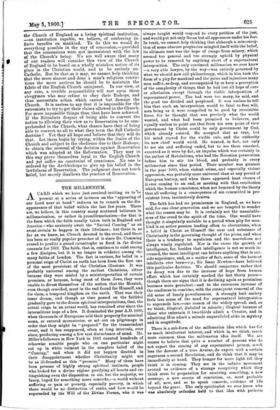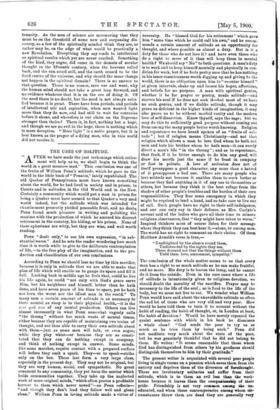THE MILLENNIUM.
ACARD which we have just received inviting us to *be present at a series of lectures on the "appearing of our Lord near at hand" induces us to remark on the dis- appearance of that belief within the last few years. There are, we believe, in this country many scattered believers in millenarianism, or rather in premillenarianism—for that is the form which the faith usually takes both in England and America—who anxiously await the "Second Coming" as an event certain to happen in their lifetimes ; but there is, so far as we know, no Church devoted to the creed, and there has been no really popular preacher of it since Dr. Cumming ceased to predict a grand catastrophe as fixed in the divine counsels for 18GS. The faith, that is, continues to exist among a few disciples, but it is no longer in evidence among the many faiths of London. The fact is curious, for belief in a personal reign of Christ on earth has been from the first one of the most persistent of the Christian illusions. It was probably universal among the earliest Christians, either because they were misled by a misinterpretation of certain promises, or because, being most of them Jews, they were unable to divest themselves of the notion that the Messiah, even though crucified, must in the end found for Himself, and for them, a temporal kingdom on the earth. That was their inner dream, and though as time passed on the faithful gradually gave to the dream spiritual interpretations, that, the actual reign in an actual world, has remained ever since the intermittent hope of a few. It dominated the year A.D. 1000, when thousands of Europeans sold their property for nominal sums, or entered monasteries, or set out on pilgrimage in order that they might be "prepared" for the transcendent event, and it has reappeared, often at long intervals, ever since, producing among a few vast disturbance of mind. Mr. Miller's followers in New York in 1843 counted hundreds of otherwise sensible people who on one particular night sat up in white raiment in the complete belief of the "Coming," and when it did not happen doubted in their disappointment whether Christianity might not be as ill-founded as this "promise." Many of them have been persons of highly strung spiritual instincts, people who looked for a divine regime purifying all hearts and ex- tinguishing even the disposition to sin, but the majority, we fancy, hoped for something more concrete,—a world without suffering or pain or poverty, especially poverty, in which there would be no distinction of ranks, and Law would be superseded by the Will of the Divine Person, who it was
always taught would respond to every petition of the just, and would put not only Satan but all oppressors under his feet. In truth, we cannot help thinking that although a misconcep- tion of some obscure prophecies mingled itself with the belief, its ultimate root was the hope of escape from misery, which seemed too general and too strongly upheld by physical power to be removed by anything short of a supernatural interposition. The only convinced millenarian we ever knew —a very, able lawyer, by the way—was entirely governed by what we should now call philanthropy, which in him took the form of a pity for mankind and the pains and injustices many men suffer, so deep, and accompanied by so keen a perception of the complexity of things, that he had lost all hope of cure or alleviation except through the visible interposition of supernatural power. The bad were too many, he said, and the good too divided and perplexed. It was useless to tell him that such an interposition would be fatal to free will, men being as it were compelled to be good by irresistible force, for he thought that was precisely what the world wanted, and what had been promised to believers, and equally useless to point out that from his own point of view government by Christ could be only government by God, which already existed. He accepted that as true, but his mind craved for the visible rule, and the authority its new chief would wield. He wanted, in fact, not only to see sin and suffering ended, but to see them smashed, executed as it were by fiat, an impulse which was certainly in the author of Revelations, who had the Neronian persecution before him to stir his blood, and probably in every millenarian since that period. Their number was greatest in the year 1000, when violent crime, and especially violent oppression, was probably more universal than at any period of European history, and when there appeared least chance of it ever coming to an end, or meeting with that retribution which the human conscience, when not bemused by the theory that all suffering is a consequence of sin committed in pre- existent lives, instinctively desires.
The faith has had no prominence in England, as we have said, for one clear generation and we are tempted to wonder what the reason may be. It is certainly not the unsuitable- ness of the creed to the spirit of the time. One would have thought it singularly suitable to a period when pity for man- kind is an active passion leading often to aberrations, when a belief in Christ as Himself the sum and substance of Christianity is the governing thought of the pious, and when there is a tendency to mysticism and the marvellous not always wisely regulated. Nor is the cause the growth of intelligence, for, besides that intelligence is not so much in- creased, the most intelligent can believe anything that is out- side experience, and, as a matter of fact, some of the keenest intellects ever born—e.g., Sir Isaac Newton—have believed this particular doctrine. We should conjecture rather that its decay was due to the increase of hope from human effort which has certainly marked the last thirty years— though there are signs that it is declining again as pessimism becomes more prevalent—and to the enormous increase of the readiness to combine, with the consequent removal of the old sense of lonely powerlessness. A strongly knit society feels less sense of the need for supernatural interposition to supersede law,—one reason of the widely spread, and, as we think, illogical, disbelief in miracle ; illogical because of those who entertain it two-thirds admit a Creator, and in admitting Him admit a miracle unparalleled alike in mystery and in magnitude.
There is a sub-form of the millenarian idea which has for us much intellectual interest, and which is, we think, much more common than the millenarian idea itself. We see reason to believe that quite a number of persons who do not expect the coming of any supernatural person, much less the descent of a true Avatar, do expect with a certain eagerness a second Revelation, and do think that it may be immediately at hand. They hunger for more light till they think it is coming. They see in the infinite movement around us evidence of a strange receptivity which they think must be preparation for receiving something, a new message, a new source of conviction, or, most probable of all, new, and so to speak concrete, evidence of life beyond the grave. The only spiritualist we ever knew who was absolutely orthodox held to that idea with pathetic
tenacity. As the men of science are murmuring that they must be on the threshold of some new and surpassing dis- covery, so a few of the spiritually minded think they are, or rather may be, on the edge of what would be practically a new Revelation. Everything they say tends to intellectual or spiritual results which yet are never reached. Something of the kind, they argue, did come in the domain of secular thought in the fifteenth century, when the heavens rolled back, and the sun stood still, and the earth ceased to be the fixed centre of the universe, and why should the same change not happen in the spiritual domain? There is no answer to that question. There is no reason, save use and wont, why the human mind should not take a great leap forward, and no evidence whatever that it is on the eve of doing it. Of the need there is no doubt, but the need is not always satis- fied because it is great. There have been periods, and periods of intellectual stir and aspiration, when men wanted light more than they do now, and had still to wait for centuries before it shone, and wherefore is our claim on the Supreme stronger than theirs ? There is, in fact, nothing but a hope, and though we see no evil in the hope, there is nothing which is more deceptive. "More light" is a noble prayer, but it is best known as the prayer of a dying man, who in this world did not receive it.







































 Previous page
Previous page